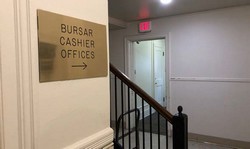University President Patrick Leahy informed students that annual tuition will increase by 2.75 percent for the 2020-21 academic year, in an email announcement sent on Wednesday, June 24.
The Board of Trustees approved a 3.75 percent increase for tuition and comprehensive fees last February but reevaluated in response to the COVID-19 pandemic’s economic impact, according to the email.
“With this new reality as a backdrop, our Board of Trustees voted to lower the tuition and fees increase to 2.75 percent,” Leahy wrote. This increase translates to an added cost of $540 per semester.
However, faculty members remain opposed to the decision. Marina Vujnovic, Ph.D., Faculty Council Chair and an Associate Professor of Communication, explained that she understands that the tuition increase was planned last year and that students will be offered more money in the form of scholarships but disagrees with any increase during a global pandemic.
“[The increase] really is a value statement. I personally wrote to President Leahy to please reconsider this decision, and I also stated at the Board meeting that I would have liked to see no tuition increase during the pandemic that resulted, arguably, in one of the worst economic downturns this country has ever faced,” Vujnovic said.
Johanna Foster, Ph.D., the Helen McMurray Bennett Endowed Chair of Social Ethics and an Associate Professor of Sociology, was stunned when she heard of the tuition increase and speculated other faculty members were too. “Even before COVID, I had students tell me the tuition hikes of last year were too high for them to stay at Monmouth and they had to transfer, which was really heartbreaking for them and me too.”
She continued, “What may look to some like a small percentage increase on paper has enormous consequences in real life for real students, especially when we consider that we are looking at an almost 7 percent tuition increase in just two years—and one of those was during a global pandemic.”
Nizhé Bailey, a senior music industry student, explained that the tuition increase, during a time where close family and friends are getting sick or dying and unemployment has skyrocketed, has put greater pressure on herself and her family. “Having to pay for school by myself is already hard, but when your place of work closes and you don’t have anyone that can help you pay for school, a tuition increase is the last thing a person like me needs. Stressed at this moment in time is a complete understatement if I’m being honest,” she said.
“Raising tuition at all during a pandemic does seem to send a message that we are out of touch with how so many of our students and their families are living right now,” Foster said. “A policy that puts our students and families at risk of falling deeper into debt, particularly during the worst economic and health crisis our country has seen in a century, is hard to define as a student-centered response,” she elaborated.
Brittany Macaluso, a senior social work student, said, “With all of the uncertainty in the world the last few months, figuring out how to pay for education should not be one of them.”
In light of financial hardships for students across the U.S., many public and private universities have halted tuition increases for this academic year. Leahy explained that Monmouth’s decision factored in those economic realities. “By lowering the tuition increase to its lowest point in nearly 50 years, and, at the same time, increasing our financial aid budget to the high level in the University’s history—$79.2 million, we continue to make Monmouth University as accessible and affordable as possible,” he said.
The University allocated $2.5 of $5 million received from the Coronavirus, Aid, Relief, and Economic Security (CARES) Act to the Higher Education Emergency Relief Fund (HEERF) for student aid and distributed over 2,800 grants to students.
Leahy further explained that all students with Pell grant eligibility received a CARES Act grant, as well as graduated students with financial needs similar to Pell grant recipients. “We continue to support our students facing pandemic-related financial hardship with tuition relief fund grants,” he said.
Vujnovic explained that the increase so soon after these funds were distributed “feels inconsistent.” “It is hard to fully understand the decisions that our administration makes as there is little to no budget transparency.”
“Involving students and faculty fully in budget planning and decision making around the budget would not only bring crucial voices to the discussion but would ultimately provide a pathway for everyone to understand and appreciate why some decisions are necessary,” Vujnovic said.
Foster agreed that without the administration disclosing specifics regarding the budget and expenses during the pandemic, it is hard to comprehend why raising tuition was necessary, especially why the burden of any deficit would fall to students.
Conversely, Leahy believes the administration has budget transparency. He has been holding open calls with faculty and all staff, weekly or bi-weekly, throughout the year to provide updates on Monmouth’s financial situation and plans to continue that.
“I want our students to be aware of the formidable financial challenges we need to overcome. The universities pandemic-related expenses total approximately $10 million and counting,” Leahy said. These fees include refunding room and board, technology expenses associated with the transition to remote and hybrid learning, sanitation protocols, and loss of revenue from NCAA revenue and other programs.
As of now, the funds from the tuition increase are not reserved for specific projects, but academic pursuits account for the majority of the operating budget which is 75 percent tuition-driven, Leahy explained.
Still, Vujnovic would like to examine the budget in more detail to see how increases are distributed, as she is unsure if and how yearly tuition increases are benefiting academic programs. “Until faculty is part of the budget conversation, we won’t be clear on these issues. But here is what I do know. University’s academic budget is the largest and it has received the largest cuts in the past.”
Vujnovic added that the Faculty Council voted on the COVID-19 resolution and determined that there should not be a tuition increase at the University this academic year. Vujnovic has become increasingly concerned with the economic model that higher education institutions employ, Monmouth included, specifically the financial pressure hoisted on students and their families. “This model is not sustainable, and we need to have a serious conversation about how we see the future of the higher education and the future of this country as they are intrinsically related,” she said.
Foster, who teaches classes on economic inequality, believes that Monmouth needs to take measures to be more affordable if they want students who are not economically privileged to seriously consider attending Monmouth.
“It’s about values. It’s about priorities. Lowering tuition is one major way we could do that, among other no-brainers like restructuring excessive administrative salaries or shifting the balance of spending away from athletics and toward academics, but those solutions do not seem to be seriously entertained for reasons that are head-spinning if we are truly interested in supporting all of our students and families,” Foster said.
Vujnovic concluded, “I was heartened when President Leahy, in one of his Convocation speeches, said that MU was built amid the great depression as a junior college to provide education to those who otherwise would have never been able to be educated on the college level. Higher education is about the opportunity to better yourself and should be available to everyone who desires to better themselves. We need to remind ourselves of that and our actions need to follow our words.
PHOTO TAKEN by Matthew Cutillo



